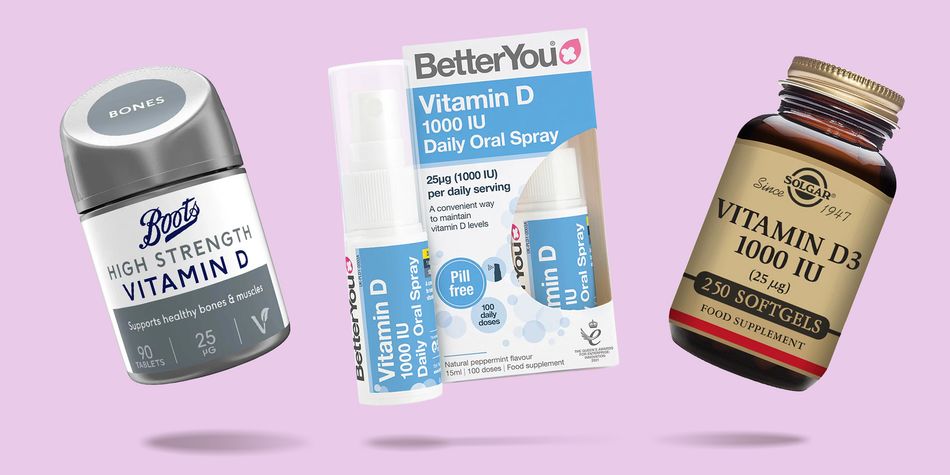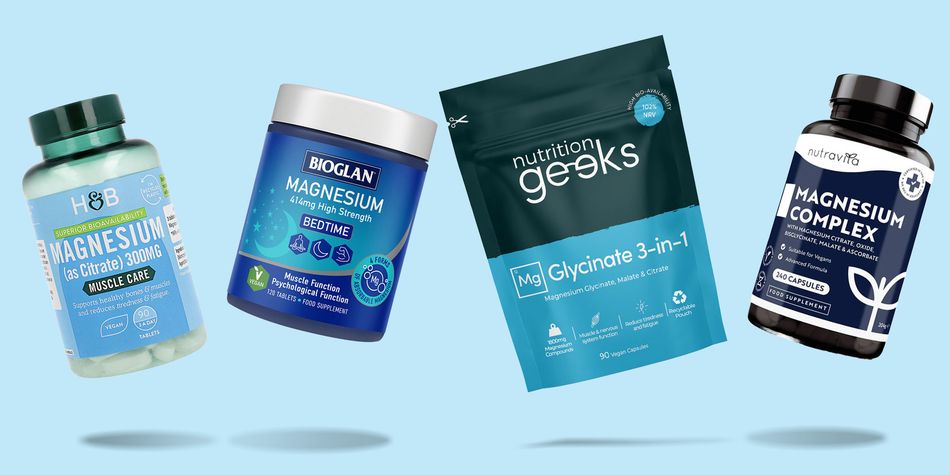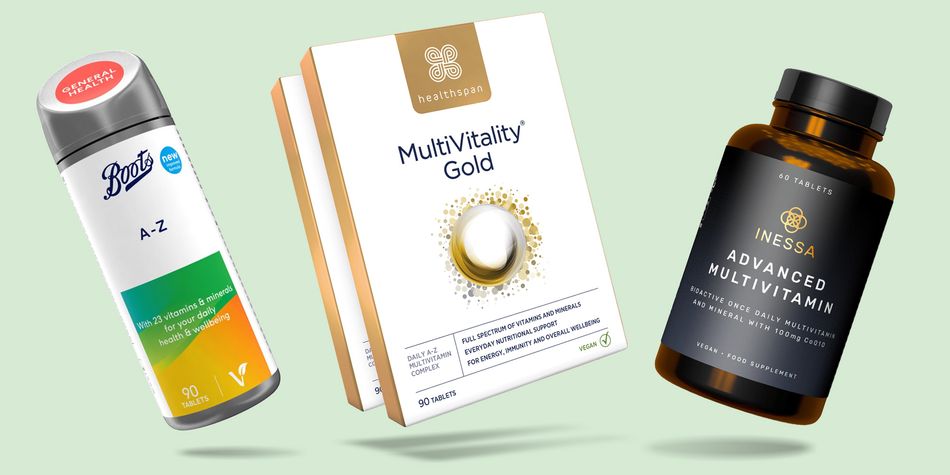Supplements in risky doses found across online marketplaces and on the high street
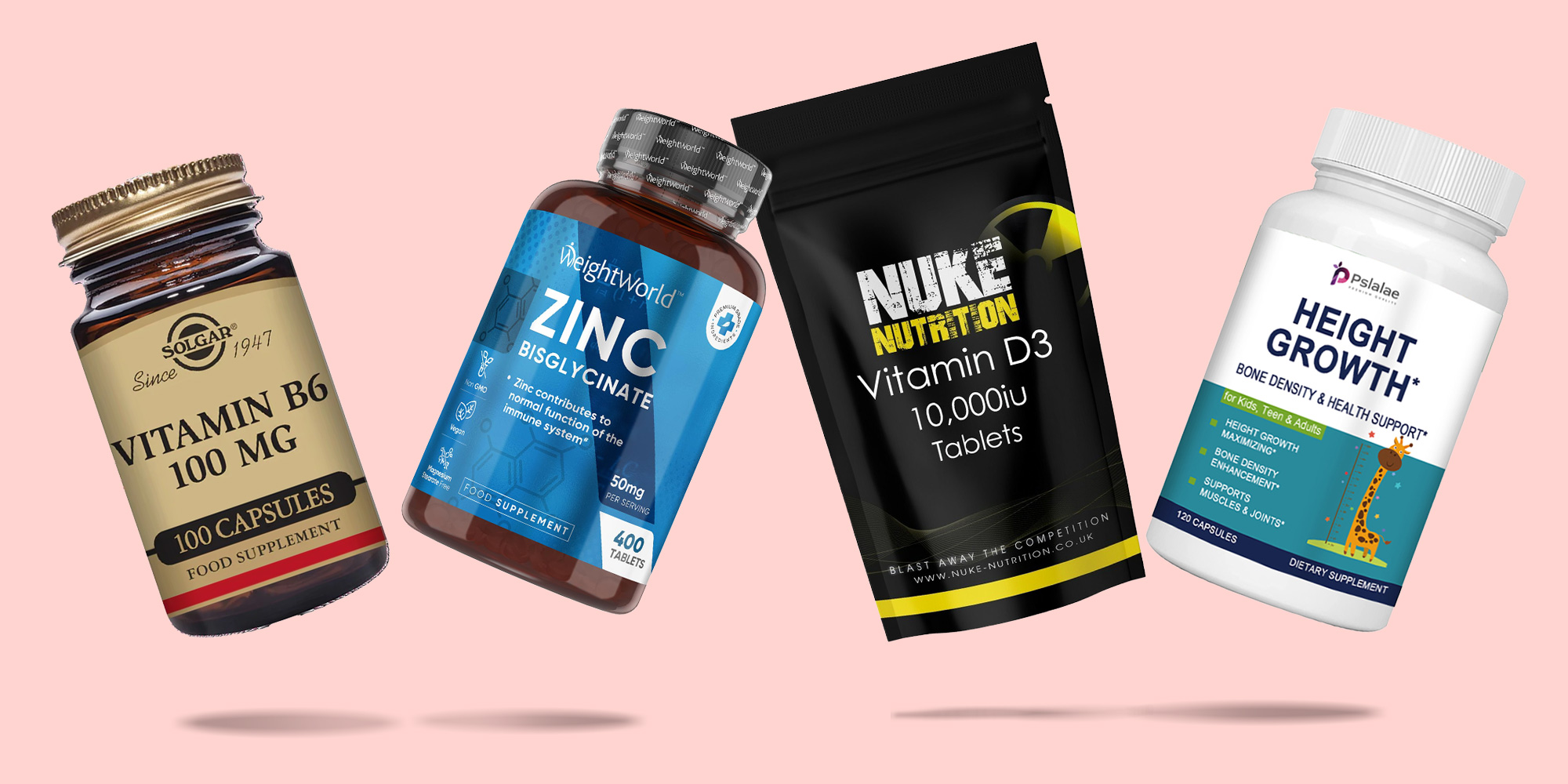
If you go shopping for supplements, you’d expect to find something that would improve your health, not harm it.
But we've spotted supplements for sale on online marketplaces and beyond, including big-brand retailers such as Amazon and Superdrug, with doses as much as 12.5 times more than the recommended maximum safe daily limit.
The range of supplement brands available has mushroomed over the past decade, and more and more people are buying them online.
When we surveyed 2,028 UK adults in September 2025, 35% said they would consider buying supplements from Amazon, 17% from Superdrug Marketplace and 10% from eBay. And a 2024 Mintel report suggests 44% of people buy supplements online versus in store.
But regulations haven't kept up, and it's putting people's health at risk. When we checked major online marketplaces, we found numerous examples of supplements being sold above recommended safe upper levels, including vitamin D3, vitamin A, vitamin B6 and zinc.
All of these carry a risk of harm when taken at excessively high doses.
We also found some high street examples, although there were fewer to be found here.
The supplements exceeding the advised safety limits
We focused our search on the most popular mainstream vitamin and mineral supplements that carry the biggest risk of harm when taken in high doses: vitamin A, vitamin B6, vitamin D3 and zinc.
We found multiple examples of concerningly high dose levels across the range of brands and retailers we checked.
Vitamin D supplements: 12.5 times the safe limit
- Recommended safe daily upper level 4,000 IU or 100µg, advised by the NHS
- Recommended safe daily upper level for children aged one-10 2,000 IU or 50µg, advised by the NHS
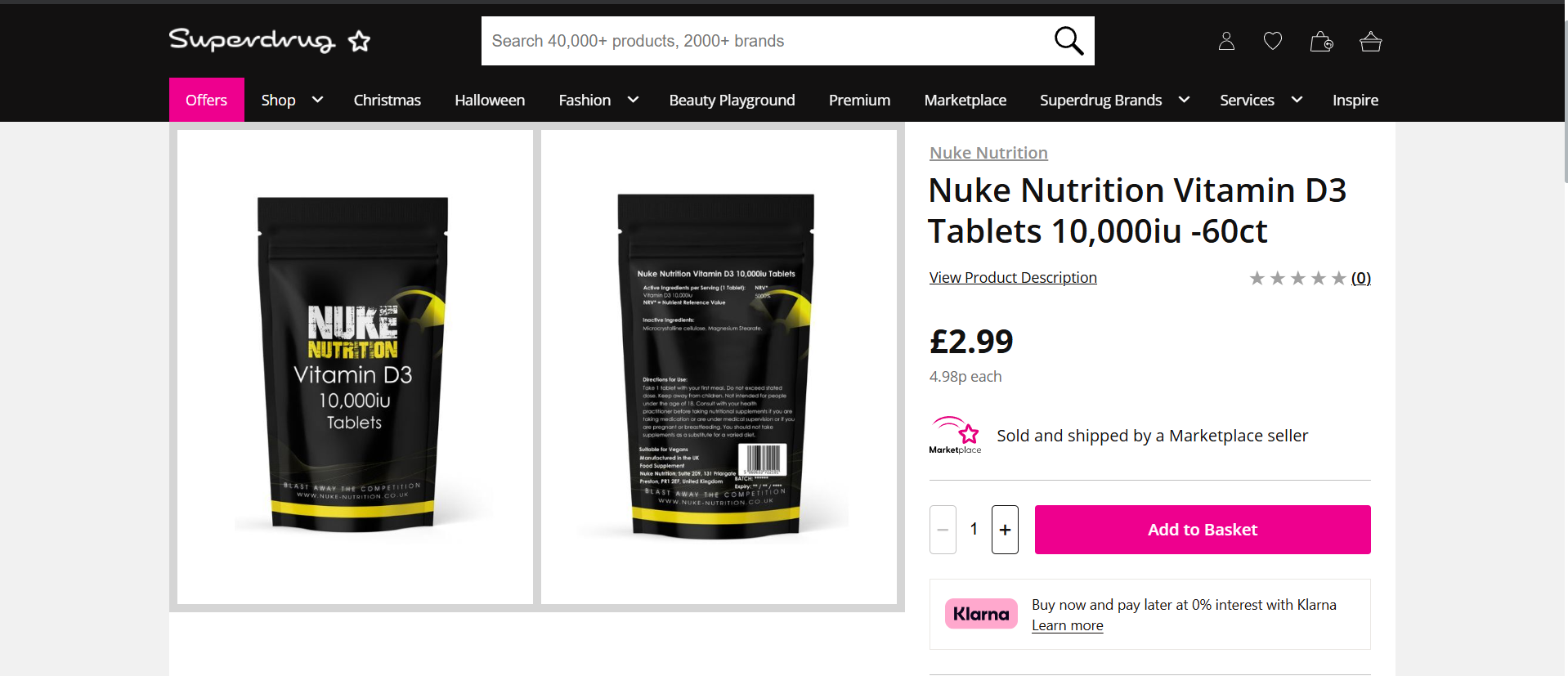
We spotted Nuke Nutrition's eye-catching 10,000 IU (250µg) vitamin D3 supplements for sale on eBay, Superdrug Marketplace and TikTok shop, described as ‘a convenient way to maintain optimal Vitamin D levels’.
But, in reality, a regular dose as high as 10,000 IU, which is more than twice the recommended safe daily upper level, puts you at greater risk of hypercalcaemia – too much calcium in your blood. This can have wide-ranging health consequences, from vomiting and confusion to weakening of the bones, and damage to your heart and kidneys.
High doses of vitamin D, beyond the advised upper daily limit, are sometimes prescribed to treat severe vitamin D deficiency by a GP. However, these are typically taken once a week for a short period of time (for example, six weeks), and this should only happen under the direction of a doctor because of the risk involved.
When we contacted Nuke Nutrition about this product, it immediately withdrew it from sale while it investigated.
It's concerning to see a product like this available on a mainstream pharmacy brand's website. But what we found elsewhere was even more alarming.
On AliExpress, we found two different vitamin D3 supplements in 50,000 IU (1,250 µg) doses. That's 12.5 times more than the safe maximum daily dose recommended by the NHS.
Vitamin D supplements for kids
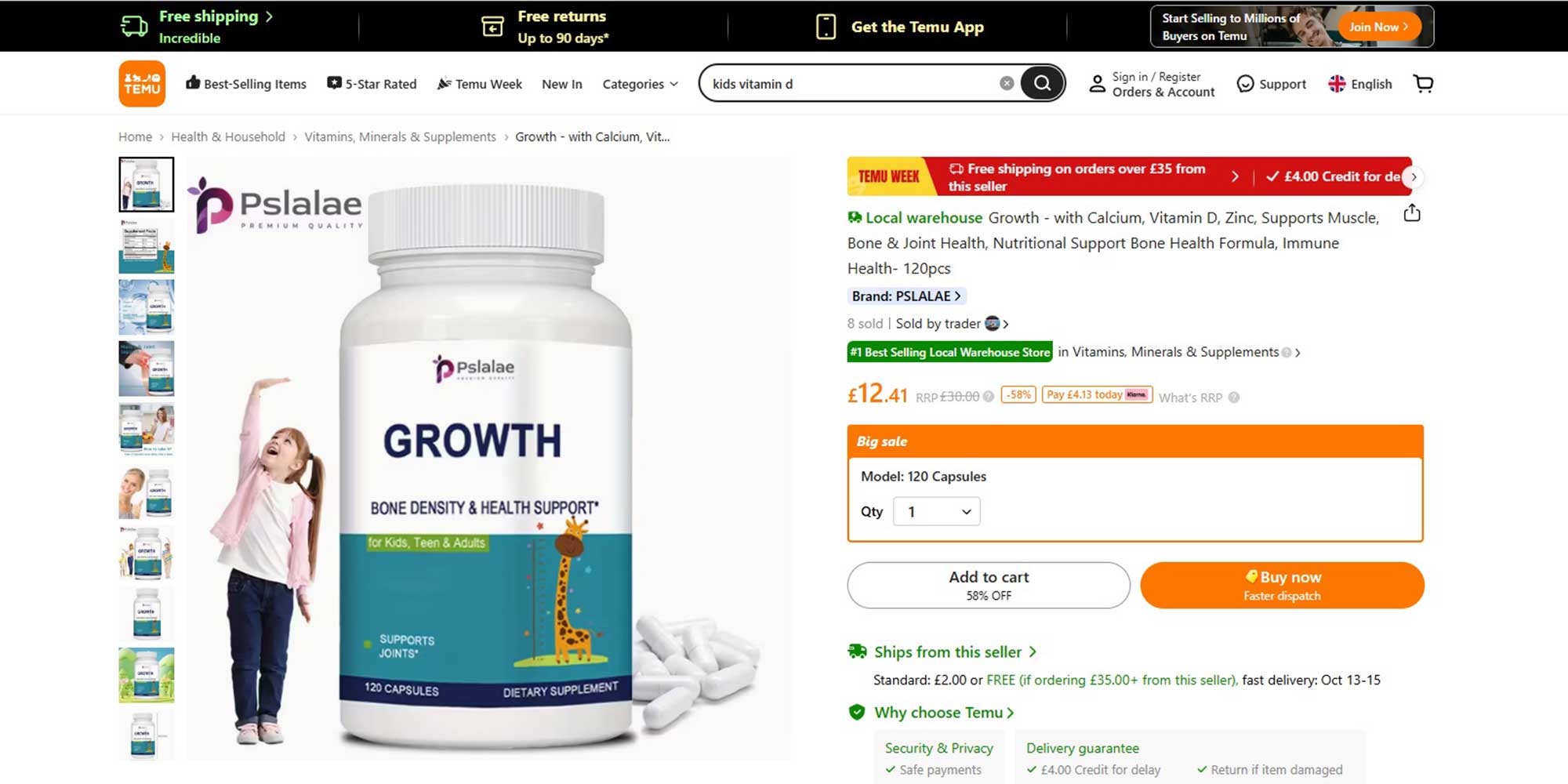
The troubling doses go beyond supplements for adults. Temu had ‘Growth’ and ‘Height Growth Maximiser’ supplements from the brand Pslalae available to buy, described as ‘perfect for kids, teens and adults’ with pictures of children included in the listings, even a cartoon giraffe on the bottle.
But these vitamins contained 2,500 IU (62.5µg) of vitamin D3, exceeding the safe upper level for children recommended by the NHS (50µg).
What the expert says:
Sophie Medlin, consultant dietitian and founder of CityDietitians, says: 'Vitamin D is a very important nutrient and deficiency is common.
'GPs are great at testing for vitamin D deficiency when asked and will recommend the appropriate supplementation at higher doses if needed. This will then be monitored.
'Taking excessive vitamin D can lead to complications such as the laying down of calcium deposits (calcification) of arteries and vessels, which puts our heart health at risk.'
Find the best vitamin D supplements at approved doses with our independent expert review
Vitamin A supplements – five times the safe limit
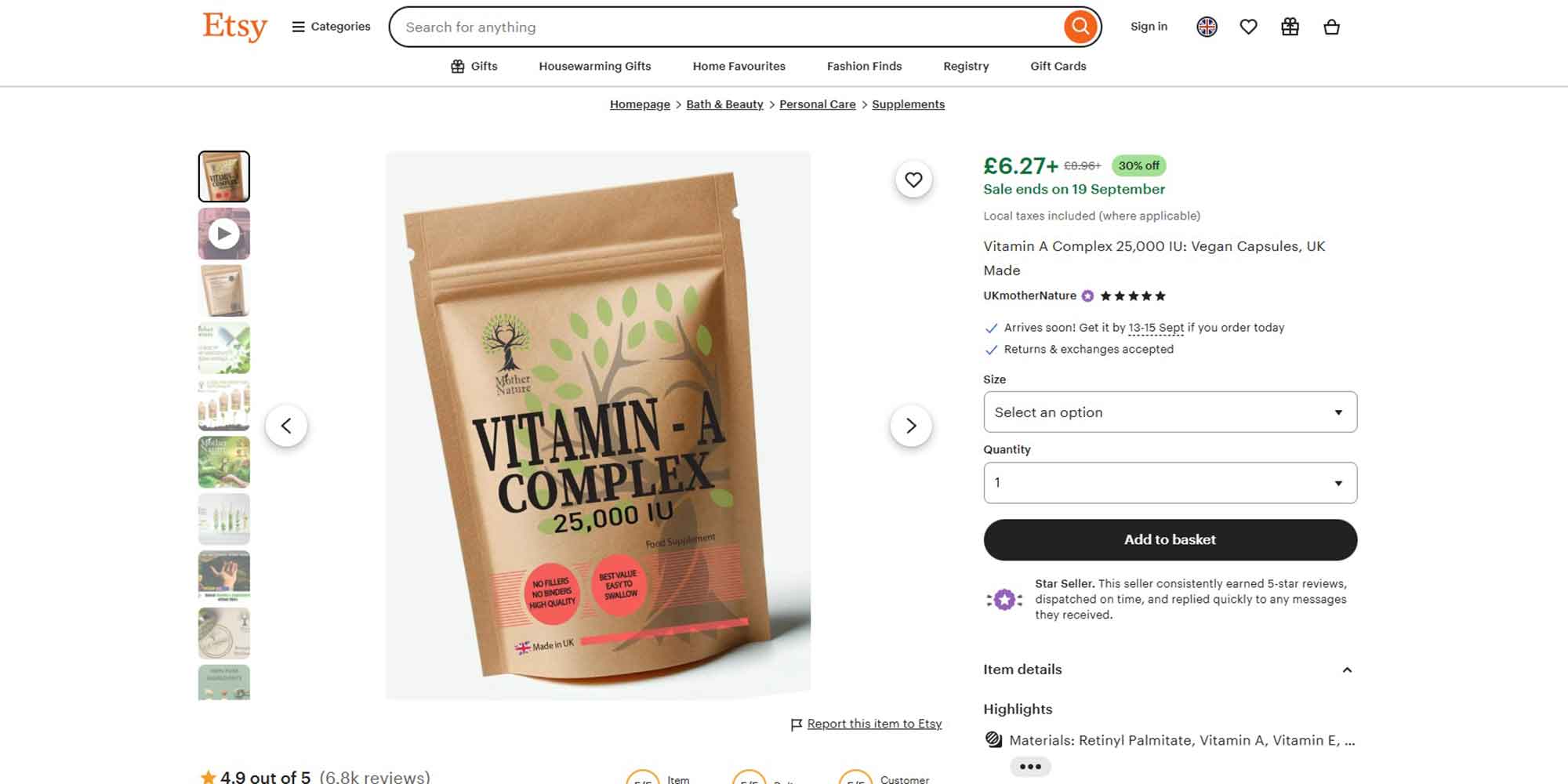
- Recommended safe daily upper level: 1500µg, advised by the NHS
eBay, Etsy and TikTok shop all had 25,000 IU, or 7,500µg, vitamin A supplements for sale from Mother Nature Supplements, which is more than five times the maximum safe upper limit advised by the NHS.
The NHS warns that excessive amounts of vitamin A can increase the weakness of your bones and the risk of fracture, as well as damage your liver.
Other supplements exceeding the limit included:
- WeightWorld 3,000µg vitamin A supplement For sale on Amazon, eBay, Superdrug Marketplace, Temu and TikTok shop.
- Horbäach 3,000µg vitamin A supplement Sold on Amazon and TikTok shop.
These supplements contain twice the limit the NHS suggests. Horbäach told us it aligns with the European Food Safety Authority (EFSA), which last year set a safe upper level of 3000µg.
The products do carry warnings of risks, including for pregnant women. In response to our article, Mother Nature Supplements added a warning to the packaging against taking the supplement for a long period of time.
What the expert says:
Sophie says: 'Vitamin A is a fat-soluble vitamin which can be stored in the body, so you do need to be careful about taking too much. Too much preformed vitamin A can cause liver toxicity, bone problems, neurological problems and birth defects if taken by pregnant women.
'Large trials of high-dose vitamin A have shown no benefit, but have shown potential harm.
'Sometimes high-dose vitamin A is given for specific clinical conditions, such as part of measles treatment or for some eye conditions, but this is always under medical supervision.
'There is no benefit to taking a high-dose vitamin A supplement, but potentially a lot of harm.'
Vitamin B6 – 10 times the safe limit
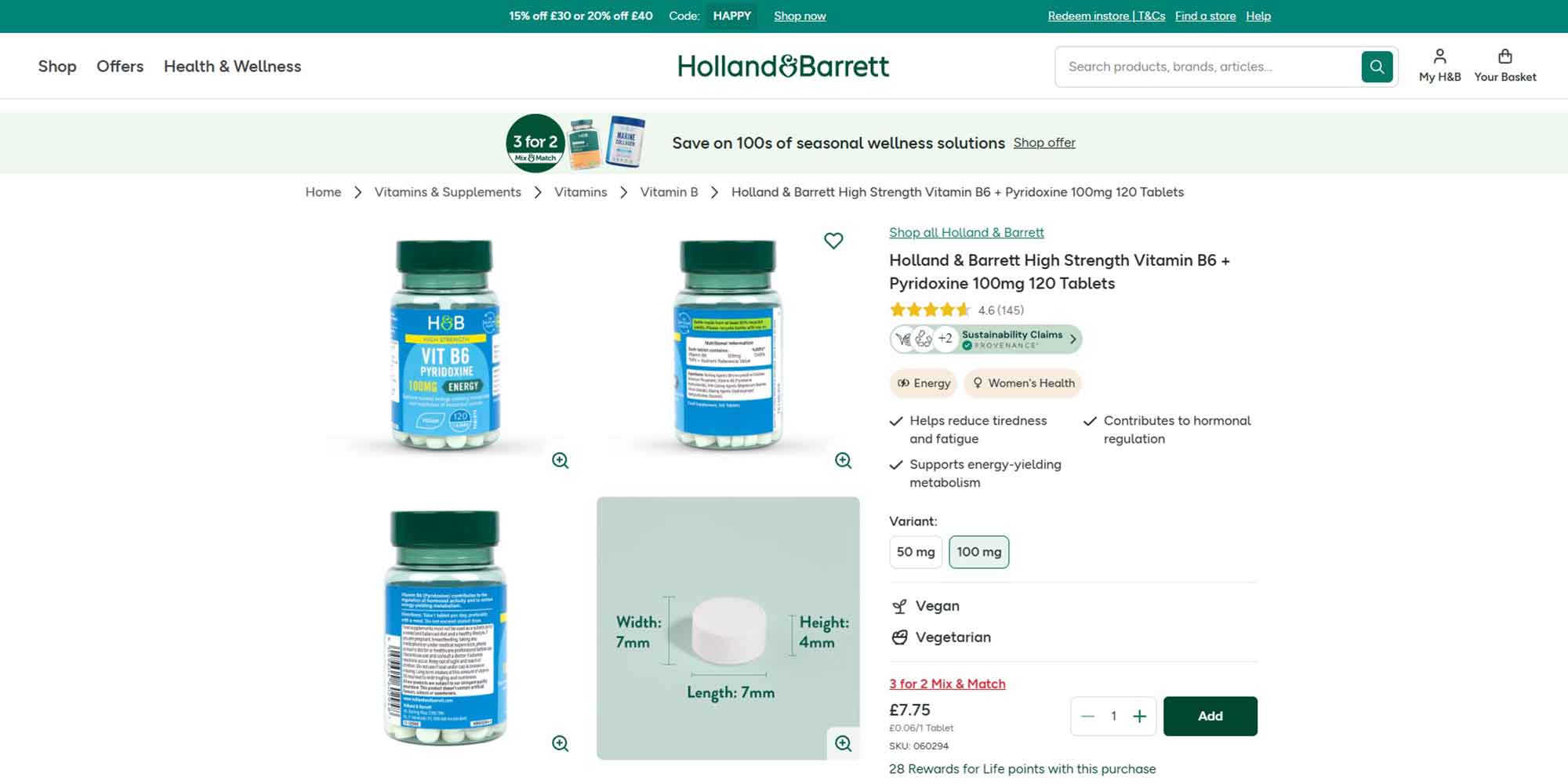
- Recommended safe daily upper level 10mg, advised by the NHS and Expert Group on Vitamins and Minerals (EVM)
A vitamin B6 supplement on Temu says it ‘supports nervous system health’ at a dose of 100mg, but experts warn that taking too-high doses of vitamin B6 over time can cause tingling, numbness and other nerve issues that may be permanent.
We found several alarming examples of very high doses online, but were surprised to also find some from well-established high street brands Holland & Barrett and Solgar.
Unlike the supplement on Temu, both of these brands do include the voluntary warning requested by the Food Standards Agency (FSA) for doses above 10mg, which says long-term intakes of this amount of vitamin B6 may lead to mild tingling and numbness’, but we still don't think there's justification for such a high dose.
A Nestlé Health Science spokesperson, on behalf of Solgar, said, ‘Current industry best practice as per the Health Food Manufacturers’ Association (HFMA) guidance suggests a safe upper level of less than or equal to 100mg daily supplementation, as recommended by FSA, DoH and EVM findings.’
This doesn't chime with our research, however, which shows that the safe upper level was set at 10mg by the EVM, while the EFSA lowered its own safe upper level to 12.5mg in 2023 after it found evidence to establish with ‘sufficient certainty’ that some people taking 50mg of vitamin B6 a day may experience peripheral neuropathy.
The HMFA recommends 10mg for long-term use, but sets a safe upper level of 100mg for short-term use. Generally, it's advisable that this is under the supervision of a doctor.
Holland & Barrett withdrew its high-dose B6 product after we contacted it with our findings. The brand told us it started the process earlier in the year of re-formulating its vitamin B6 products in line with the 2023 updated EFSA guidance, expecting the new supplements to be on sale by the end of October 2025.
What the expert says:
Sophie says: 'Recent research has shown that high-dose B6 over 10mg per day over time can cause peripheral neuropathy, which can feel like tingling in the hands and feet.
'There is some low-quality evidence for the use of higher-dose B6 in PMS and mood disorders, nausea in pregnancy and in combination with other B vitamins, in reducing homocysteine levels associated with heart disease risk.
'However, none of this evidence is robust enough to take higher than 10mg per day in the long term unless there is a medical need and supervision in doing so.'
Zinc – double the safe limit
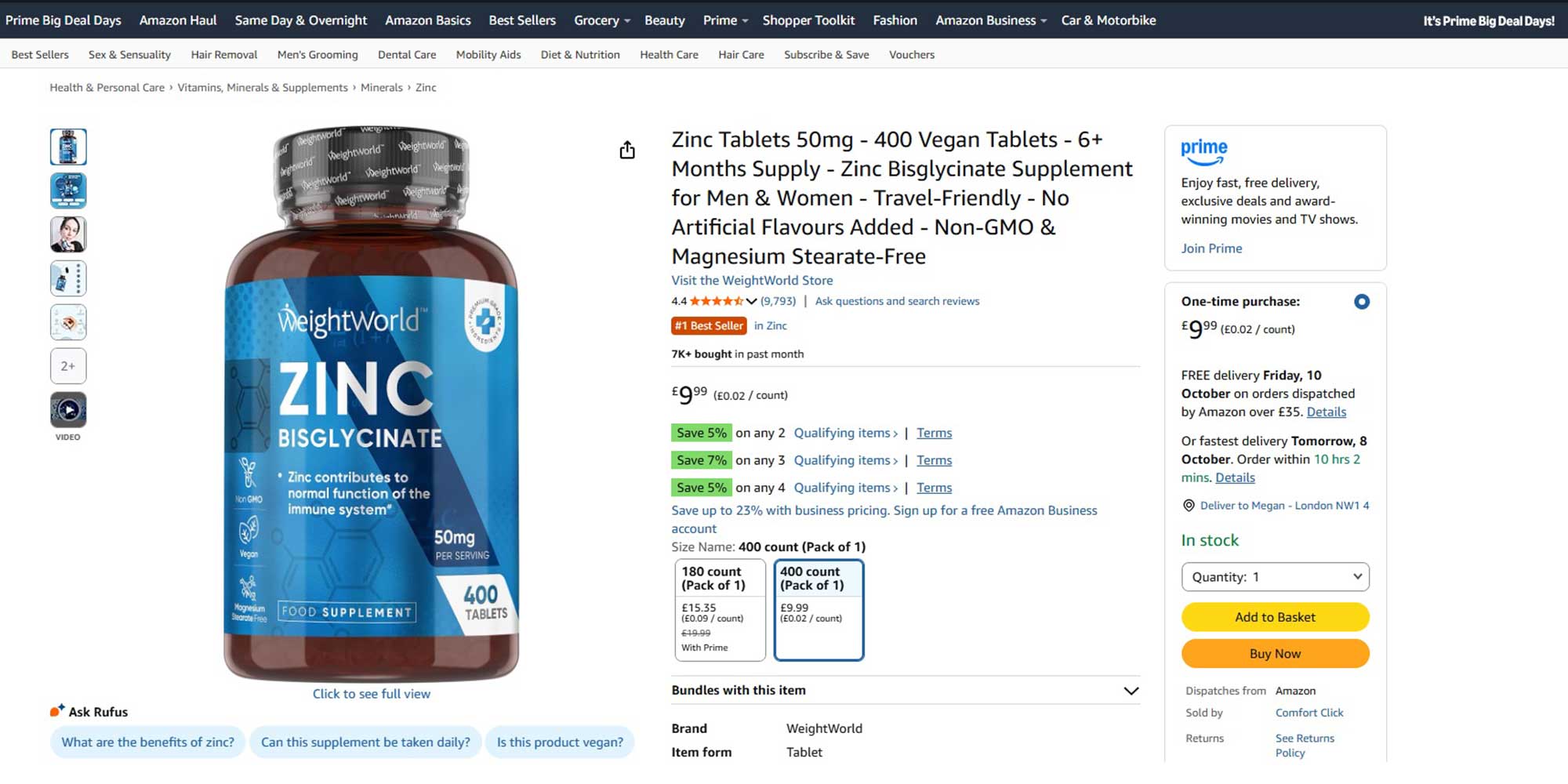
- Recommended safe upper level 25mg, advised by the NHS and EVM
Taking more than 25mg of zinc a day can lead to a copper deficiency, which can cause fatigue and anaemia, as well as impaired immune function.
Yet Amazon’s most popular zinc supplement when we checked was from the brand WeightWorld, containing 50mg – double the safe upper level.
This product was also available on eBay, Temu, TikTok shop and Superdrug Marketplace. It does include the voluntary FSA warning for this dose level, which warns that long-term intake of 50mg of zinc may lead to anaemia.
Another 50mg zinc supplement from Now Foods, also for sale on eBay and TikTok shop, was labelled as ‘Amazon’s Choice’, and we found a 50mg New Leaf zinc supplement on Superdrug and Amazon marketplaces.
New Leaf said: ‘Our Zinc supplement provides 50mg per serving to offer flexibility in dosage, as many customers prefer to take one tablet (25mg) rather than the full serving.
'A higher dosage accommodates individuals who choose to consume 40-50mg daily to help reduce the duration or severity of colds and flu, and to support skin health (acne, eczema, wound healing), as well as athletic performance and recovery, levels comparable to typical ZMA formulations.’
Neither supplement contained the voluntary anaemia warning on the product listings, although New Leaf told us the warning was on the packaging itself and it would add it to the product listing online after our investigation.
Neither WeightWorld nor Now Foods responded to our requests for comment.
What the expert says:
Sophie says: 'The recommended daily dose of zinc from food and supplements is 9.5mg/day for men and 7mg/day for women. The EFSA recommends that we don’t exceed 25mg per day, as this can cause copper deficiency due to flooding of the receptors for the absorption of copper and zinc, impaired immune function and gastrointestinal symptoms.
'Some studies have shown that taking high-dose zinc within 24 hours of having a cold can shorten the duration by one to two days. This is short-term use only.
'Otherwise, there are no known benefits to taking high-dose zinc, but plenty of risks of doing so.'
Our online supplement safety research
We checked products against the safe upper levels for daily supplementation set by the Expert Group on Vitamins and Minerals (EVM), an independent expert group established by the UK government to determine safe upper limits for vitamins and minerals based on the available science.
These form the basis of advisory guidelines in the UK, as well as the limits recommended by the NHS. We also took into account more recent guidance from the European Food Safety Authority (EFSA).
We selected vitamins and minerals where the EVM felt there was enough evidence to set a specific safe upper level, or where the NHS used the strongest language around upper limits (for example, a warning such as ‘do not take more than X of this vitamin’). There are known health consequences to doing so long-term.
These are largely voluntary, but we think consumers would expect them to be followed and to have the appropriate information on the risks made clear to make an informed decision.
We have reported our findings to the retailers and brands involved, and shared our findings with the FSA and FSS.
Discover the best magnesium supplements with insights and tips from our nutrition experts
Supplement labels aren't up to scratch
We found that many supplements lacked crucial on-pack information about how much of the active ingredient is actually in the supplement, making it difficult to easily assess whether the dose is safe and what you need.
One boron glycinate supplement listed by the brand 7 Chakras on Amazon was advertised as 200mg, while the boron safe upper level is 9.6mg. When we contacted the brand, it explained that this amount of boron glycinate translates to around 10mg of active boron (although it refused to share its lab reports confirming this).
This information was nowhere to be found on the packaging or the product listing. Other brands advertise their boron glycinate supplements, as smaller amounts such as 10mg or 3mg, referring to the active ingredient amount, making for a confusing landscape when comparing products.
A vitamin D3 supplement on eBay said it contained 60mg ‘vitamin D3 formulation’ on the packaging, but there was conflicting information about how much vitamin D it actually contained, saying both 125µg in the small print of the listing and 10,000 IU in the product name – both above the 4,000 IU limit recommended by the NHS.
You should easily be able to tell how much of a vitamin or mineral you’re taking, so you can make an informed decision about which product to buy. UK law requires that supplements include a mandatory label showing the ingredients, allergens, recommended daily dosage, and the nutrient content – how much of a vitamin or mineral is present in the product.
We need better protection for supplements
These types of supplements are classed as food under the Food Supplements Regulations 2003 and are regulated by the Food Standards Agency (FSA) and Food Standards Scotland (FSS).
They're subject to a general requirement to be safe, but safe upper levels are specified in voluntary guidelines, based on advice from the UK’s Expert Group on Vitamins and Minerals (EVM).
The EVM took in all of the available research in 2003 and set safe upper levels for different vitamins and minerals, where there was enough evidence to do so, but these aren't legal limits and are only advisory. At the time, the supplement industry agreed to either re-formulate products that exceeded these amounts or add warning labels about the risks.
However, it's been more than two decades since these guidelines were established, and the market looks completely different. The popularity of supplements has skyrocketed, and the rise of online marketplaces means there are no longer just a handful of major brands on the market.
Regulation needs to keep up with a changing market to avoid people being harmed when trying to make healthy choices.
Sue Davies, Which? head of food policy, said:

'It’s shocking that supplements containing potentially dangerous doses of popular vitamins and minerals are so readily available on online marketplaces and beyond.
'Taking more than the recommended dose of these vitamins and minerals could lead to some really harmful side effects, such as liver damage and weakened bones.
'Better regulation and oversight of the supplements industry is desperately needed so that consumers aren'tt put at risk by regularly consuming products which contain more than the advised safe upper levels.'
How to take supplements safely
You can check the NHS guide to vitamins and minerals for advice on safe upper levels for vitamins you want to take, and always keep in mind that more isn't necessarily better.
Sophie advises: 'For most people, taking a sensibly dosed supplement is safe. Check that the percentage NRV (nutrient reference value) on the label isn’t excessively beyond 100%, particularly for fat-soluble vitamins A, D, E and K.
'If you take any prescription medications or have a medical condition, always check with your GP, a pharmacist or a dietitian before taking any new supplements just to be safe.'
It's also important to be extra careful if you're taking multiple supplements. Some may contain common vitamins and minerals as extras in order to make specific health claims, so always check the labels to ensure that you aren't inadvertently overdoing it.
About our expert
Sophie Medlin, consultant dietitian and founder of CityDietitians

Sophie Medlin is a well-recognised consultant dietitian with nearly 20 years' experience working across the NHS and academia, as well as in her own private practice at CityDietitians.
Sophie is chair of the British Dietetic Association for London.
With her in-depth knowledge of nutrition – both theoretical and applied – Sophie has helped to formulate supplements, giving her insight into the strengths and weaknesses of products and the manufacturing process.
What did the retailers say about our findings?
AliExpress said 'As a global marketplace, AliExpress places great emphasis on product safety. The platform has effective prevention and control strategies in place, and we noticed that this non-compliance product had already been taken down by the corresponding monitoring rule early this month, before receiving this enquiry. We appreciate your attention to this important issue and remain committed to fostering a safe and secure environment on our platform.'
Amazon said 'We require all products offered in our store to comply with applicable laws and regulations, and the products flagged by Which? meet the current government-mandated regulatory guidance in relation to upper levels for vitamins and minerals.
'However, we are aware there is continued debate around what the right guidance should be, and we look forward to continuing to work with industry experts and government agencies in this area.'
eBay said 'eBay is committed to ensuring that products sold on our marketplace comply with our policies and all applicable laws. The limits published by the NHS and the Food Standards Agency’s Expert Group on Vitamins and Minerals are advisory levels only.
We continue to review our policies in line with evolving guidance from health authorities to help ensure eBay remains a safe and trusted marketplace.'
Etsy did not respond to requests for comment.
Holland & Barrett said 'At Holland & Barrett, we are committed to providing high-quality, science-backed products, reflecting the latest scientific and regulatory guidance.
'As a responsible retailer, we regularly carry out our detailed reviews led by our science and regulatory teams, and we took the proactive decision earlier this year to bring our vitamin B6 range in line with the EFSA advisory limit. As a result, newly reformulated products will be available to customers this month. H&B products not in line with the EFSA guidelines are already being withdrawn, with this process due to be complete by the end of October 2025.
'Continuous improvement of our portfolio remains central to our mission of supporting the health and wellbeing of our customers, and we will continue to adapt our products in line with the most up-to-date scientific and regulatory advice.'
Superdrug said 'Our customers’ health and wellbeing are always our priority. Our marketplace platform sellers must follow the guidance provided and we have therefore removed all the products that have been highlighted by Which?.'
Temu said 'Temu complies with all applicable UK laws and regulations governing the sale of food supplements. We expect all sellers to follow local laws and regulations, and listings found to contravene these are subject to prompt review and removal.'
TikTok shop said 'Supplements containing unauthorised or banned substances are not allowed to be sold on TikTok Shop. We have removed all of the flagged listings from our platform, and we consistently align our policies with regulatory and national guidance, including from the NHS. TikTok uses a combination of technology and manual moderation to enforce our policies for TikTok Shop.
'TikTok has policies and processes to protect customers and promote a trustworthy shopping experience. This includes policies on what can and can't be sold, seller registration and verification requirements, and features like product reviews, reporting tools, and easy returns.'
What did the regulators say about our supplement findings?
Steve Adie, head of standards policy at the Food Standards Agency, said: ‘Wherever food supplements are sold, they must be safe. The FSA works with local authority partners to help make sure businesses meet their legal responsibility to sell food supplements that meet legal requirements.
‘Food businesses should take into account any published safety guidelines and available evidence when deciding the dose levels for food supplements. If supplements are found to be unsafe, local authorities can take enforcement action to protect public health.
‘Consumers should avoid taking supplements if they have any doubts about their safety. Anyone with concerns about the safety of food supplements should report this to their local authority.’
Food Standards Scotland said 'All food businesses, whether operating in a physical location or online, are required, by law, to register with their local authority and meet their legal responsibilities regarding food supplements.
'Consumers should take care when buying supplements, particularly online. We recommend checking product labels, avoiding unverified sellers, and being wary of products making medical claims or offering particularly high dosages. Anyone concerned about a supplement they believe may be unsafe should report it to their local authority’s environmental health department. Information about food crime can also be reported to the Scottish Food Crime Unit via the Food Crime Hotline (0800 028 7926).
'Food Standards Scotland works on a four-nation basis with the Department of Health and Social Care and the Food Standards Agency, and will discuss the Which? findings on supplements.'

